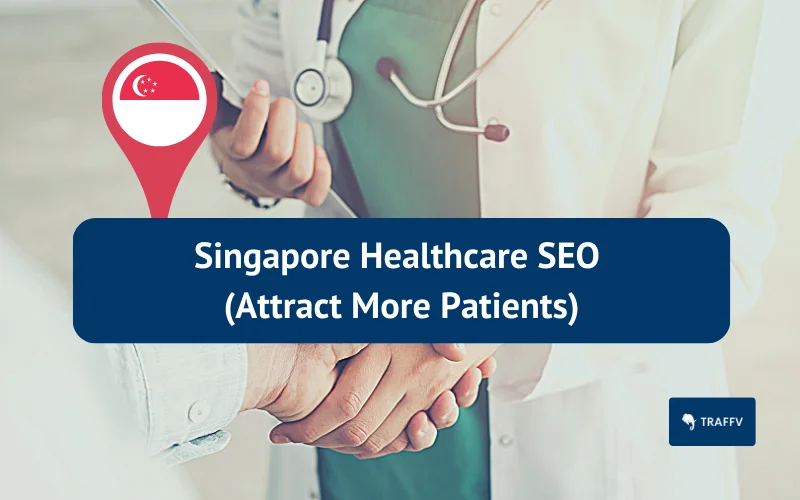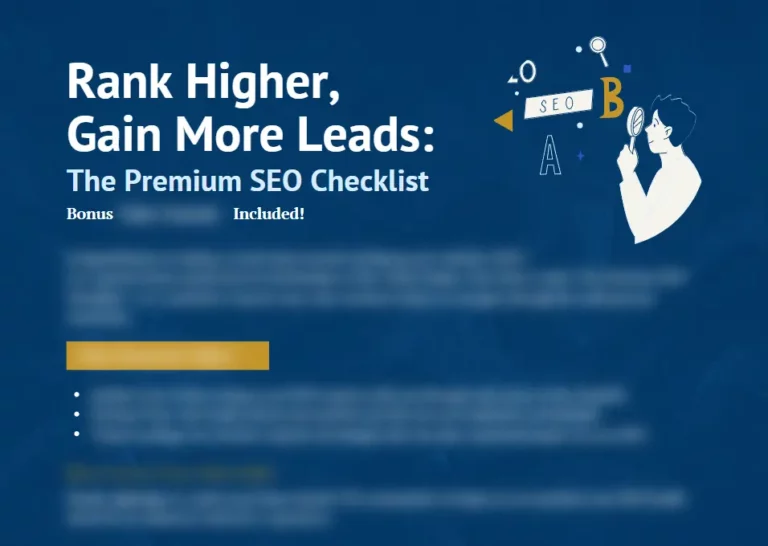In a world where online presence matters more than ever, healthcare providers in Singapore should not overlook the power of search engine optimization (SEO).
Healthcare SEO in Singapore can make a significant difference in attracting potential patients and increasing brand awareness.
Are you ready to dive into the world of healthcare SEO and learn the best strategies to ensure your clinic thrives in the digital landscape?
TL:DR
- Healthcare SEO in Singapore is essential for healthcare providers to be competitive and attract new patients.
- Successful Healthcare SEO strategies require keyword research, content creation, link building & outreach, local optimization and leveraging digital marketing channels.
- Monitoring KPIs with analytics & reporting tools are necessary to optimize strategies for attracting more patients.
Understanding Healthcare SEO in Singapore
Healthcare SEO is all about enhancing your online visibility, so potential patients searching for treatments and procedures can easily find your clinic.
With Singapore’s competitive healthcare market, a strong digital marketing strategy is vital for healthcare providers to stand out from the crowd.
In this digitally-driven era, having a well-optimized website and a strong online presence can be the distinguishing factor between a thriving clinic and one that struggles to attract new patients.
But what challenges do healthcare institutions face in implementing an effective SEO strategy, and how can they overcome them to achieve success?
Importance of SEO for healthcare providers
SEO, particularly medical SEO, is crucial for healthcare providers in Singapore, as it increases online visibility, drives traffic, and generates inquiries from potential patients.
By optimizing your website for search engines through search engine optimization, you can reach a larger audience and establish credibility as an expert in your field.
With the help of professional SEO services, you can ensure that your medical practice stands out among the competition.
In today’s competitive healthcare market, having a strong online presence is no longer optional – it’s a necessity.
Don’t miss out on the opportunity to connect with patients who are actively searching for healthcare services like yours through online marketing.
Challenges faced by healthcare institutions in digital marketing
Navigating the digital marketing landscape can be challenging for healthcare institutions in Singapore.
Strict regulations, privacy considerations, and the need to create engaging content that resonates with the target audience are just a few hurdles that healthcare providers must overcome.
Compliance with advertising regulations set forth by the Ministry of Health is essential in medical marketing.
By adhering to these regulations, healthcare providers can avoid penalties and ensure their marketing efforts are ethical and transparent.
Despite these challenges, healthcare institutions can still achieve success in digital marketing by adopting a strategic approach and leveraging the expertise of SEO experts to help them navigate through the complexities of the digital marketing landscape.
Essential Components of a Successful Healthcare SEO Strategy
To achieve success in healthcare SEO, providers need to focus on three essential components: keyword research, content creation, and link building.
By combining these elements into a cohesive strategy, healthcare institutions can rank higher in search engine results, attract more patients, and ultimately grow their business.
Let’s explore each component in detail to understand how they contribute to a successful healthcare SEO strategy.
Keyword research and targeting
Keyword research is the backbone of any SEO strategy.
By identifying relevant search terms that potential patients are using, healthcare providers can optimize their website content and ensure they rank high on Google Singapore.
For example, targeting keywords such as “laser clinic Singapore” and “laser treatment Singapore” can drive targeted traffic to a laser treatment clinic’s website.
However, targeting keywords with low search volume can hinder your SEO efforts, as patients are unlikely to search for these terms.
To assess the competitiveness of various treatments and select the appropriate keywords, healthcare providers can use tools like Google Keyword Planner.
Reduced competition for a keyword implies that there are fewer advertisers competing for the keyword on Google, which can lead to better results for your SEO campaign.
Content creation and optimization
Content is king in the world of SEO. Creating unique, informative, and engaging content is crucial for healthcare websites.
High-quality content not only boosts your search engine rankings, but also helps establish trust and credibility with potential patients.
Well-crafted blog articles, for instance, can demonstrate your expertise in your healthcare field and provide valuable information to your audience.
Content optimization is equally important, as it ensures that your content is both search engine-friendly and user-friendly.
By conducting keyword research, creating high-quality content, and employing keywords effectively, healthcare providers can optimize their on-page content to rank higher on search engine results pages and attract more patients to their clinic.
Link building and outreach
Link building and outreach are essential components of a successful healthcare SEO strategy.
Obtaining hyperlinks from external websites to your own can improve your website’s credibility and search engine rankings.
A well-crafted outreach strategy can increase your chances of receiving a response and backlink from other websites.
Healthcare providers in Singapore can employ various link building and outreach strategies, such as creating high-quality content like blog posts, infographics, and videos that other websites may be willing to link to.
Additionally, they can reach out to other websites and request a link back to their website.
The benefits of link building and outreach include enhanced website credibility, improved search engine rankings, and increased visibility to potential patients.
Implementing Local SEO for Healthcare Providers in Singapore
Local SEO is particularly important for healthcare providers in Singapore.
By optimizing for local search results, healthcare institutions can target local patients and improve their visibility in local search engine results.
This can lead to increased inquiries and appointments from patients within the area.
One key aspect of local SEO is optimizing your Google My Business listings, which we will discuss in more detail.
Optimizing Google My Business listings
Google My Business is a free tool that allows businesses to create a Business Profile and list their business on Google Search and Maps.
By optimizing your Google My Business listing, you can enhance your local visibility and SEO rankings, making it easier for potential patients to find your clinic.
Ensure that your listing is complete and up-to-date, with accurate information about your clinic’s name, address, and phone number (NAP).
Additionally, incorporate images and encourage patients to leave reviews, as these factors can improve the credibility of your local listing and boost your local rankings.
Digital Marketing Channels for Healthcare Institutions
In addition to SEO, healthcare institutions can leverage other digital marketing channels to reach a wider audience and grow their business.
Social media marketing and online advertising are two popular channels that can complement your healthcare SEO strategy.
By utilizing these platforms, healthcare providers can engage with potential patients, build brand awareness, and generate more leads.
Social media marketing services
Social media marketing services enable healthcare providers to interact with prospective patients and raise brand recognition.
Establishing and managing social media profiles, producing content for social media, and interacting with followers are all essential aspects of social media marketing.
By leveraging platforms like Facebook, Instagram, and Twitter, healthcare providers can build a strong online presence, showcase their expertise in various medical practices, and engage with potential patients.
Online advertising and PPC campaigns
Online advertising and pay-per-click (PPC) campaigns can drive targeted traffic to your healthcare website and generate leads.
By creating relevant content, setting up campaigns, and monitoring and optimizing your ads, you can reach a larger audience and attract more patients to your clinic.
Some examples of online advertising for healthcare institutions include Google Ads, display ads, and retargeting campaigns.
By implementing a strategic approach to online advertising, healthcare providers can expand their reach, target prospective patients more precisely, create more leads, and increase brand awareness.
Web Development and User Experience for Healthcare Websites
Web development and user experience are crucial aspects of healthcare websites.
A well-designed and user-friendly website can make a significant difference in attracting potential patients and retaining their interest.
Mobile responsiveness and optimal site performance are two key factors that contribute to an excellent user experience.
Let’s delve deeper into these factors and how they can improve your healthcare website.
Mobile responsiveness
In today’s mobile-driven world, having a responsive website that adapts seamlessly to different devices and screen sizes is essential.
Mobile responsiveness ensures that your website ranks higher on search engines and provides a seamless user experience, regardless of the device being used.
To optimize your website for mobile responsiveness, make sure your content is easily readable and navigable on mobile devices, and that your website loads quickly across all devices.
Site speed and performance
Site speed and performance have a direct impact on search engine rankings and user satisfaction.
A slow-loading website can lead to user abandonment, while a fast-loading site typically has higher traffic and conversion rates.
To improve your site’s speed and performance, optimize images, minify code, cache static content, and utilize a content delivery network (CDN).
Additionally, limit the number of plugins and external scripts to enhance page load time and provide a better user experience.
Monitoring and Measuring Healthcare SEO Success
To ensure your healthcare SEO efforts are successful, it’s essential to monitor and measure your progress.
By tracking key performance indicators (KPIs) and analyzing data, you can make data-driven decisions to optimize your SEO strategy and attract more patients to your clinic.
Let’s explore the tools and techniques you can use to monitor and measure your healthcare SEO success.
Key performance indicators (KPIs)
KPIs are quantifiable metrics used to evaluate the success of your SEO strategy and make data-driven decisions.
Common KPIs for healthcare providers include website traffic, conversions, and search engine rankings.
By monitoring these KPIs, healthcare providers can assess the effectiveness of their SEO strategies and identify areas for improvement.
Regularly tracking and analyzing KPIs can help healthcare providers make informed decisions and achieve their SEO goals.
This data can be used to inform decisions about content creation, keyword optimization, and other SEO tactics.
Analytics and reporting
Analytics and reporting tools, such as Google Analytics, Google Search Console, and SEMrush, can provide valuable insights into website performance, user behavior, and areas for improvement.
By tracking metrics like organic traffic volume, keyword rankings, search visibility, links, organic CTR, branded traffic, bounce rate, and average session duration, healthcare providers can optimize their SEO strategy and attract more patients.
Regularly analyzing and reporting on your website’s performance can help you make informed decisions and improve your SEO efforts.
Optimize Your Healthcare Practice in Singapore
Healthcare SEO can play a vital role in attracting potential patients and boosting your online presence.
By engaging a professional SEO agency in Singapore, you can gain the edge over your competitors, ensuring your healthcare services are prominently visible to those who need them most.
Don’t miss out on the opportunity to connect with patients who are actively searching for healthcare services like yours. Start optimizing your healthcare website today, and watch your clinic thrive in the competitive healthcare market.
Learn SEO for popular industries:
Frequently Asked Questions
What is the importance of SEO for healthcare providers in Singapore?
SEO is critical for healthcare providers in Singapore, helping them increase visibility, draw visitors, and generate inquiries from potential patients.
What are the essential components of a successful healthcare SEO strategy?
A successful healthcare SEO strategy should include keyword research, content creation and link building for optimal results.
How can healthcare providers implement local SEO?
Healthcare providers can improve their local SEO by optimizing their Google My Business listings, creating content focused on local search terms and keywords, and ensuring accurate location information.
By optimizing their Google My Business listings, healthcare providers can make sure their business is visible to local customers.
What digital marketing channels are available for healthcare providers?
Healthcare providers can use various digital marketing channels, such as social media, email, SEO, PPC advertising, and content marketing, to reach their target audience.
How can healthcare providers monitor and measure their SEO success?
Healthcare providers can monitor and measure their SEO success by tracking KPIs and analyzing data from analytics and reporting tools.




